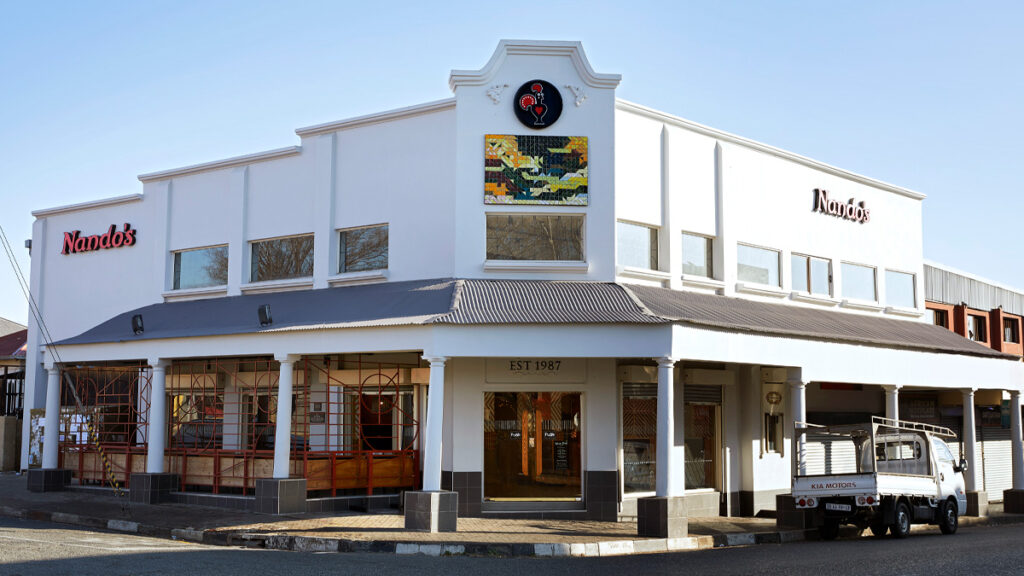The spicy tale of supersizing Nando’s
How a small venture in the suburbs of Johannesburg grew into a global success story without compromising its original down-to-earth vision

“Every prime minister needs a Willie,” announced Margaret Thatcher, the first woman prime minster in 10 Downing Street. She was referring to Lord Whitelaw, her deputy and leader in the House of Lords, whose support early in her premiership was crucial to cementing her power base in government.
In the same vein, every founder needs a Dick. Bear with us while we explain.
Without the support and funding of insurance tycoon Dick Enthoven, Nando’s might never have expanded much beyond three takeaways in dodgier parts of Johannesburg, where it was founded during political upheaval in 1987.
How Nando’s started out
It started when best friends Fernando Duarte and Robbie Brozin happened upon what they described as a “grubby little takeaway” called Chickenland in the unremarkable 1890s mining-era suburb of Rosettenville. They forget who, but one of them said to the other: “Let’s take this chicken to the world.” It was to be the start of something big.
Neither had run a business, nor prepared a meal for anyone outside their immediate families. Nevertheless, they bought the store and its recipe for Portuguese-inspired, Mozambique-style spiced chicken and named it after Duarte’s infant son, Nando.
Brozin took on the role of chief executive, while Duarte oversaw operations. They expanded to three outlets and were running them on a of mix of piri-piri, adrenaline and youthful exuberance, when staff member Bruce McInroy, who worked at the group’s central kitchen where its sauces were made and chickens marinated, suggested to Brozin that he should meet his brothers’ boss Enthoven.
Dick understood that money was a commodity that would be easier to come by as we became more successful
Robbie Brozin, co-founder, Nando’s
The entrepreneur, who was in the early stages of building a multinational insurance business, was always on the lookout for a good investment opportunity, he said.
Enthoven, who died in 2022, was notoriously media-shy, but remembered that first meeting. “We met at a Nando’s and it was the best chicken I had ever tasted. I was gnawing it off the bone. You could see these guys had worked it all out and knew where they wanted to go.”
It was at that meeting, without a contract, with no corporate advisers in sight and based only on a handshake, that Enthoven wrote the first of what became several cheques as they agreed on a 70/30 equity split between the founders and the operators. It was Enthoven who insisted the founders retain a majority stake.
“He didn’t want us to become nochschleppers,” says Brozin. Nochschlepper in this context is Yiddish for someone who simply goes along for the ride, without a sense of purpose or ambition.

How Nando’s was funded
Enthoven didn’t ask for complex ownership structures or earn-out clauses because he wanted to ensure that the founders would remain engaged in every aspect of the business. He would later counsel against their taking capital from investors whose money would dilute their holdings to a point where they would lose their motivation to keep building.
Even as Nando’s grew, Enthoven, Brozin and Duarte never signed a contract. They had the necessary governance requirements in place at corporate level, but after swapping their lawyers’ numbers when they first met, it turned out they were the same person who vouched for their integrity to the other.
It is this agreement that underpinned the creation of a business that now spans some 30 countries. The firm has more than 1,200 outlets across the UK and Ireland, North America and Canada, the Middle East, South East Asia, Australia and New Zealand.
“Dick understood that money was a commodity that would be easier to come by as we became more successful, and he did not ever want us as founders to believe that we had been screwed over. He understood that if the operators made money, so too would the investors,” says Brozin.
What makes this story remarkable is that it is atypical. Enthoven understood that if Duarte and Brozin flourished, so would he. He knew that if they remained the primary owners they would put in the work and hours needed to succeed.
Nevertheless, success in the UK was never guaranteed and there was a point when they considered exiting and went to see a potential buyer. “We came out of that meeting and Dick said to me, that if this guy, who was a real operator, was interested in buying the business, then there must be potential and we should not be selling,” says Brozin.

Why Nando’s brought in ‘adult supervision’
Instead, in 1993, they brought in Enthoven’s son Robby as managing director in the UK. He, like the original founders, had never run a business. But he saw an opportunity if Nando’s changed its operating model by getting rid of the takeaways and offering a casual dining ethos where customers would order at the counter and collect their own crockery, but be served at the table. The group’s impressive expansion won Robby Enthoven the Caterer & Hotelkeeper Catey Group Restaurateur of the Year award in 2002.
All three remain invested in a considerably more complex global business that today has professional management. By the time the global financial crisis came round, Nando’s had grown to 1,000 stores and Brozin, worn out by the demands of growth and global travel, says it was “time for adult supervision”.
Since then, the group has seen several management changes as the business has become invariably more corporate than the heady days when it was a start-up. But the core values remain, including the fact that global procurement still comes from southern Africa. While it would be easier to contract large-scale farmers in China to produce tens of thousands of tonnes of bird’s eye chilis every year, the group instead buys from hundreds of small farmers in multiple countries, including the original source of the spice, Mozambique.
It also recently ordered 9,000 pairs of jeans for its global teams of grillers made by a designer next door to its original group kitchen in Johannesburg. Each pair contains 15 per cent viscose, which is made from wood pulp, and has a small accent of red thread created by infusing it with the deep red of the chilli at the core of Nando’s offering.
Five key lessons from Nando’s success
- Investors need to keep founders interested and engaged.
- Investors and founders need to ensure their core values are aligned and that there is deep trust between the parties.
- Chief executives need to pay attention to input from the shop floor. It can be invaluable.
- Have fun. “Restaurants are retail. But while retail is brutal, restaurants are even more so. Yet customers want to see shiny eyes and smiling faces. It has to be fun,” says Brozin.
- If someone wants to buy, interrogate your reasons for selling it. Shortly after entering the UK, the founders considered exiting and went to see a potential buyer. “We came out of that meeting and Dick said to me that if this guy, who was a real operator, was interested in buying the business, then there must be potential and we should not be selling,” recalls Brozin.

